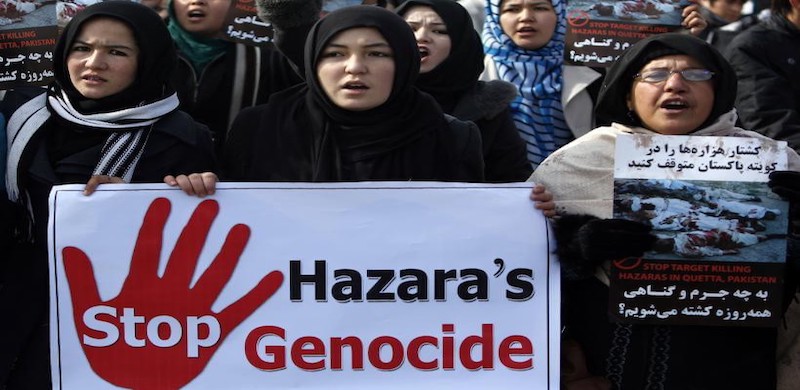Ishaq Mohammadi never wanted to leave Pakistan, but, when a close friend was killed, he felt he had no choice but to flee to the United States in 2009. In January that year, Ishaq’s friend, Hussain Ali Yousufi, who was a prominent Hazara politician and the chairperson of Hazara Democratic Party, was shot dead in front of a travel company that he ran in the provincial capital of Quetta.
Yousufi had been receiving death threats from unknown individuals via text messages prior to his murder, but was given no security by the government. Mohammadi says he decided to leave Pakistan after his friend’s murder because he had been receiving similar threatening messages and feared he would be next.
Successive governments both in the centre and the province, Mohammadi says, failed to protect the community from the violence including large-scale suicide attacks and targeted killing. According to a 2019 report by Pakistan’s National Commission for Human Rights, at least 509 Hazaras have been killed in the country for their faith since 2013. Amid the state’s apparent failure to protect them, most Hazaras who had the means to go abroad left the country and built new lives abroad.
In January last year, following the murder of 11 Hazara coal miners in the Mach district of Balochistan, then-prime minister Imran Khan said he would not be “blackmailed into visiting” protesting family members of the victims — a comment that generated widespread criticism. Mohammadi says every government has been indifferent to the plight of the Hazara community.
He added that the government had asked the Hazaras to use only one of the roads in the city, citing it as a security measure. “But these measures were in vain. It was as if our targeted killing did not matter as long as the rest of the city was safe,” he says.
For Liaquat Ali, another exiled Hazara based in New York who worked as an editorial cartoonist back home in Quetta, the realisation that Pakistan is no longer safe for him came much earlier. “I knew what was coming for our community when in 1999 Minister for Education Sardar Nisar Ali was attacked by gunmen near his office,” he says.
The minister, who belonged to the Hazara community, survived the attack, but his driver and bodyguard were killed. A few months after the incident, Ali moved to New York where his brother already lived.
How Hazaras were seen as a liability in their own hometown
Ali recalls feeling a sense of hostility from non-Hazara communities in Quetta during the wave of violence. “They thought we were a liability to them,” he says.
In June 2012, a blast ripped through a van from Balochistan University of Information Technology in Quetta, killing four students. 11 others including non-Hazara students were injured in the attack. Liaquat Ali’s niece was on the bus at the time of the attack. “She managed to survive because she was in the backseat,” he says, adding that she was a third-year medical student and was passionate about becoming a doctor. She moved to the US along with her family after this attack and had to abandon her education as well as her dream to become a doctor.
In the wake of the van attack, the city’s all-women Sardar Bahadur Khan University callously asked Hazara students to take a separate bus. Muhammadi says the university’s announcement was not a one-off, and this sentiment against Hazaras was common in the city. “My son who was then a first-year Intermediate student was often told by his non-Hazara peers that they fear being targeted because of him.”
Life in exile
While Hazara exiles have found safety away from home, memories of persecution continue to haunt them. Mohammadi remembers breaking down into tears when he heard his son, who now lives with him in New York, speak to a journalist about how he was ostrasised by his classmates in Quetta due to his Hazara identity.
Asylees fleeing violence are often advised to use mental health resources and visit trauma centres after escaping their countries. But most Hazaras who ended up in New York never got a chance to seek psychological help as they struggle to make ends meet in an expensive city.
When Liaquat Ali moved to New York in 2000, he worked menial jobs to pay the bills. His first job in New York was at a grocery store where he could only stay for a week. “The owner did not pay me the amount he had promised at the end of the week, saying that I was under training. I quit after realising I was being exploited,” he said.
Since Ali had a background in the arts, he eventually utilised his graphic design skills and began offering designing services in New York. He set up a small design business in 2002 and his clientele grew in no time. He has since expanded the business and now owns a manufacturing company.
But most exiles are not as fortunate. Mohammadi says he had an easy lifestyle in Quetta in terms of financial security, but has still now found a stable job in the US. He occasionally works as a translator for Persian-language news outlets and sometimes as a cashier at grocery stores.
‘Hazaras can never trust the Pakistan embassy’
The embassy of their country of origin is usually the first point of contact for diasporas when they need assistance, but exiled Hazaras don’t trust the Pakistan embassy. Liaquat Ali organized a number of protests in New York against persecution of the community, including the one outside United Nations headquarters in 2003, which was the first demonstration held for Hazaras abroad. Supposedly due to his activism, he faced hostility from Pakistani authorities on more than one occasion.
“In 2010, I received a call from a staff at the Pakistan Consulate in New York who threateningly asked me where I live and what I do. He kept reminding me that I have a family back in Pakistan, as if trying to warn me against protesting the persecution of my community.”
When Ali arrived at the Karachi airport for a visit to Pakistan in 2012, he was stopped by the authorities who told him his Pakistan visa was “fake”. Ali feared he might be arrested if he travelled to the country on National Identity Card for Overseas Pakistanis (NICOP), which is why he used his US passport and had to get a visa from New York before travelling to Pakistan. “I told them this visa has been issued by their own consulate in New York. How could it be fake? But they refused to listen to me.”
He then went to Dubai to get a fresh visa, and visited the Pakistan consulate daily for 10 days. The officials kept delaying the process and at one point refused to grant him the visa while refunding his application fee. After much ado, he was finally granted a Pakistani visa from Dubai, but it stated that he would not go to Cantonment areas. The Head of Chancery at the consulate told him they were reluctant to issue him a visa because Afghan Hazaras falsely claim to be from Pakistan to get Pakistani visas.
“I knew all along that the mistreatment I faced at the airport and later at the consulate was due to my Hazara identity, and the head of chancery confirmed it,” he says. “This is why as asylees we can never trust the Pakistan embassies and consulates.”
Pakistan’s Consulate in New York did not respond to request for comment.
Abandoned by fellow countrymen abroad
Hazara exiles mostly mingle within their own ethnic community, and are not connected to the rest of the Pakistani diaspora in New York. They do have some support from progressive Pakistani activists and journalists based in the city who were also forced into exile due to violence and threats, but the larger Pakistani community does not see them as one of their own.
“It was only three or four years ago that the Pakistani community in the US found out who we [Hazaras] are,” says Ishaq Mohammadi, adding, “They previously thought we were an ethnicity from Gilgit or some other region.”
He recalls how a group of Pakistanis shouted “ghaddar!” (traitor) while passing by a protest demonstration organized by Hazara activists outside Pakistan consulate in New York. “We stayed loyal to the motherland despite being butchered en masse, yet we are termed traitors just because we ask not to be killed,” he laments.
A version of this article first appeared on Dawn.

The writer is a journalist and the Founding Editor of Dissent Today. She tweets @AiliaZehra and can be reached at ailiazehra2012@gmail.com

